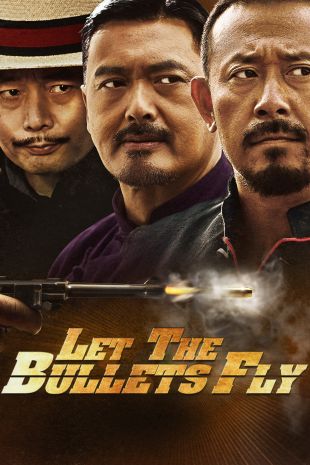
Originally released in China in December 2010, Jiang Wen's Let the Bullets Fly achieved the momentous feat of becoming that country's highest-grossing domestic release ever. With its playful humor, colorful performances, and competent direction, the film does display a degree of quirky charm that survives the translation; unfortunately for Westerners, much of the nuance that made this historical action comedy such a rousing success at home simply doesn't play well for English-speaking viewers unfamiliar with the language and customs of Chinese culture. For a largely dialogue-driven action comedy that's much lighter on gunplay than the title (and frenetic trailers) would suggest, this may not be a major distraction for audiences who speak the language, though all others should be advised to proceed with caution.
South China: 1919. It's the era of warlords, and Goose Town is about to receive a new governor. But as his train charges through the countryside, benevolent bandit leader Pocky Zhang (Wen) launches a surprise ambush from the hills. In the ensuing chaos, the governor's counselor is accidentally killed, leaving the official (Ge You) and his wife (Carina Lau) the sole survivors. But the governor hasn't exactly earned his new post by being a strong leader, and he quickly forges a partnership with Pocky in which the bandit will pose as the new governor in order to scam Goose Town out of some serious money. The one factor Zhang and the governor failed to account for, however, is the wealthy and powerful Master Huang (Chow Yun-Fat). A merciless crime boss disguised as a respectable businessman, Master Huang has no intention of ceding control of Goose Town, which he rules with an iron fist; in addition, his paranoia has driven him to hire a look-alike in a desperate bid to avoid assassination. From the moment Pocky and his crew arrive in Goose Town, Master Huang senses that his rule is about to be challenged. And he's right, because Huang, Pocky, and the rightful governor are soon engaged in a violent struggle for power and untold wealth.

The plot for Let the Bullets Fly has all of the necessary ingredients for a rollicking Western filled with great action and lively humor. And by opening the film with an exciting train robbery executed with energy, wit, and style, Wen gets us primed for an exceptionally fun action comedy. Almost immediately after that, however, something unexpected happens. The action comes to a standstill for nearly an hour, and the plot is delivered with such rapid-fire dialogue that it's difficult for English speakers to keep pace with the flickering subtitles. As a result, it feels as if much of the plot's nuance and a good portion of the comedic dialogue's delivery are lost in translation. Fortunately, Yun-Fat is a joy to watch as both the evil Master Huang and his dim-witted doppelganger. His performance goes a long way in making the extended, action-free segments a bit more bearable. And though Wen's direction overall is stylish and competent, the action sequences in Let the Bullets Fly are surprisingly pedestrian. The score, by composer Joe Hisaishi (Sonatine, Spirited Away), however, does a commendable job of fusing Eastern and Western sensibilities in a manner that perfectly complements the film's more sweeping moments.
There's nothing quite like the feeling of getting caught up in a compelling story and realizing you're absolutely riveted despite having little or no cultural reference points to fall back on. It can be invigorating, exciting, and refreshingly unique. With that in mind, Let the Bullets Fly seems to have been made for a fairly specific audience -- and the fact that it performed so well in China obviously says something about the quality of the talent that went into producing this lighthearted yarn. If only there were a bit more for Western audiences to latch on to, perhaps we'd be able to actually enjoy the film, rather than simply appreciate it.
